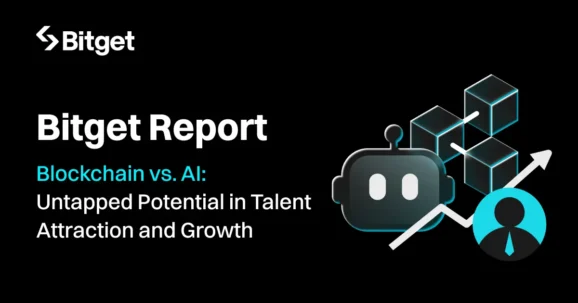Blockchain boom could create over 1 million jobs by 2030, new report claims

John E. Kaye
- Published
- Technology

Blockchain technology could spark a hiring boom to rival artificial intelligence, creating more than a million new jobs by 2030 if adoption accelerates, according to a new report by cryptocurrency exchange and Web3 company Bitget
The analysis, titled Blockchain vs. AI: Untapped Potential in Talent Attraction and Growth, suggests blockchain remains a “sleeping giant” with the power to reshape global employment on a similar — or even greater — scale than AI.
Bitget’s findings show that while blockchain’s current job market lags far behind AI’s, the potential is enormous.
Today, there are an estimated 15,000–20,000 active blockchain job listings worldwide, mainly in North America (40%), Asia-Pacific (35%) and Europe (20%).
By contrast, AI boasts over a million openings, backed by decades of corporate investment and regulatory support.
If blockchain adoption matches AI’s trajectory, it could support up to 1.5 million jobs by 2030, the report claims — provided key hurdles like regulatory clarity and enterprise adoption are met.
Gracy Chen, CEO of Bitget, said: “Blockchain is where AI was a decade ago — a technology brimming with potential but awaiting its ‘big bang’ moment.
“With the right mix of regulation, education, and enterprise adoption, it could redefine global employment landscapes.”
The report identifies the EU’s Markets in Crypto-Assets (MiCA) regulation and corporate pilots by firms like JPMorgan (Onyx) and Visa (USDC integration) as signs that institutional acceptance is growing.
However, funding remains a sticking point: blockchain startups attracted just $25 billion in venture capital in 2023, compared to AI’s $100 billion-plus.
Education and scalability are also said to be crucial. Universities including MIT and Stanford are integrating blockchain into their courses, much like they did for AI in its early days. Meanwhile, technology upgrades — such as Ethereum’s improvements and layer-2 solutions like Arbitrum — are needed to cut costs and boost blockchain’s efficiency.
The sector’s salaries are already impressive. Roles such as smart contract auditors command average pay of $115,000 to $191,000, and could climb past $250,000 in the coming years — rivalling the top AI engineering salaries at companies like OpenAI.
Countries like Singapore, with proactive blockchain policies, are poised to become global hiring hubs — just as Silicon Valley became the heart of AI development.
Bitget’s own growth reflects the sector’s trajectory. Its workforce has increased from 200 employees in 2022 to over 1,900 today — an 850% rise in just three years.
Currently, the exchange has 129 open positions worldwide, with a focus on compliance, business development, blockchain engineering, and AI-driven product management.
High-demand regions include APAC (especially Vietnam and Singapore) and the MENA region, where Bitget is expanding to align with local blockchain strategies such as Vietnam’s national blockchain initiative.
Notably, 33% of recent applicants at Bitget come from traditional banking backgrounds, drawn by the crypto sector’s higher salaries and innovation-driven culture.
Bitget believes the next few years could see blockchain move from a niche technology to a major driver of global economic growth.
“The question isn’t if blockchain will mirror AI’s rise, but when — and whether the world is ready to harness its full potential”, the report adds.

Main photoLeeloo The First/Pexels
RECENT ARTICLES
-
 Europe opens NanoIC pilot line to design the computer chips of the 2030s
Europe opens NanoIC pilot line to design the computer chips of the 2030s -
 Building the materials of tomorrow one atom at a time: fiction or reality?
Building the materials of tomorrow one atom at a time: fiction or reality? -
 Universe ‘should be thicker than this’, say scientists after biggest sky survey ever
Universe ‘should be thicker than this’, say scientists after biggest sky survey ever -
 Lasers finally unlock mystery of Charles Darwin’s specimen jars
Lasers finally unlock mystery of Charles Darwin’s specimen jars -
 Women, science and the price of integrity
Women, science and the price of integrity -
 Meet the AI-powered robot that can sort, load and run your laundry on its own
Meet the AI-powered robot that can sort, load and run your laundry on its own -
 UK organisations still falling short on GDPR compliance, benchmark report finds
UK organisations still falling short on GDPR compliance, benchmark report finds -
 A practical playbook for securing mission-critical information
A practical playbook for securing mission-critical information -
 Cracking open the black box: why AI-powered cybersecurity still needs human eyes
Cracking open the black box: why AI-powered cybersecurity still needs human eyes -
 Tech addiction: the hidden cybersecurity threat
Tech addiction: the hidden cybersecurity threat -
 Parliament invites cyber experts to give evidence on new UK cyber security bill
Parliament invites cyber experts to give evidence on new UK cyber security bill -
 ISF warns geopolitics will be the defining cybersecurity risk of 2026
ISF warns geopolitics will be the defining cybersecurity risk of 2026 -
 AI boom triggers new wave of data-centre investment across Europe
AI boom triggers new wave of data-centre investment across Europe -
 Make boards legally liable for cyber attacks, security chief warns
Make boards legally liable for cyber attacks, security chief warns -
 AI innovation linked to a shrinking share of income for European workers
AI innovation linked to a shrinking share of income for European workers -
 Europe emphasises AI governance as North America moves faster towards autonomy, Digitate research shows
Europe emphasises AI governance as North America moves faster towards autonomy, Digitate research shows -
 Surgeons just changed medicine forever using hotel internet connection
Surgeons just changed medicine forever using hotel internet connection -
 Curium’s expansion into transformative therapy offers fresh hope against cancer
Curium’s expansion into transformative therapy offers fresh hope against cancer -
 What to consider before going all in on AI-driven email security
What to consider before going all in on AI-driven email security -
 GrayMatter Robotics opens 100,000-sq-ft AI robotics innovation centre in California
GrayMatter Robotics opens 100,000-sq-ft AI robotics innovation centre in California -
 The silent deal-killer: why cyber due diligence is non-negotiable in M&As
The silent deal-killer: why cyber due diligence is non-negotiable in M&As -
 South African students develop tech concept to tackle hunger using AI and blockchain
South African students develop tech concept to tackle hunger using AI and blockchain -
 Automation breakthrough reduces ambulance delays and saves NHS £800,000 a year
Automation breakthrough reduces ambulance delays and saves NHS £800,000 a year -
 ISF warns of a ‘corporate model’ of cybercrime as criminals outpace business defences
ISF warns of a ‘corporate model’ of cybercrime as criminals outpace business defences -
 New AI breakthrough promises to end ‘drift’ that costs the world trillions
New AI breakthrough promises to end ‘drift’ that costs the world trillions



























